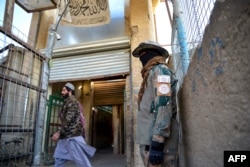A Pakistani diplomat said Wednesday that nearly 450,000 Afghan nationals returned to their home country since his government announced two months ago that it would deport all undocumented foreigners.
Asif Durrani, Pakistan’s special envoy to Afghanistan, shared the latest data while addressing a seminar in the Pakistani capital, Islamabad. He spoke on a day the United Nations renewed its warning that Afghans returning from Pakistan “face a precarious, uncertain future” in their crisis-hit and impoverished nation.
The Pakistani government says its crackdown is primarily targeting an estimated 1.7 million Afghans who have overstayed their visas or do not possess any document to justify their stay in the country.
“Those who have been asked to leave are the illegal immigrants here. They don’t enjoy the refugee status,” Durrani stressed. “So, almost 450,000 [Afghans] have left. They knew that they were illegal stayers here in Pakistan.”
Those subjects of the deportation drive include close to 700,000 people who took refuge in Pakistan after the withdrawal of the United States and NATO troops from Afghanistan in August 2021.
Durrani clarified again, however, that nearly 2.3 million documented Afghan nationals, including 1.4 legal refugees, hosted by his country are not being asked to leave.
The envoy rejected international criticism of the “lawful” expulsions, saying countries around the world routinely deport foreigners who breach their immigration laws. “It [deportation] becomes legal there in Europe or elsewhere but doesn’t become legal here in Pakistan,” he said. “I think we need to remove this confusion.”
Washington is pressing Islamabad to prevent the deportation of approximately 25,000 “vulnerable” individuals who fled the Taliban’s August 2021 takeover in Afghanistan and could be eligible for relocation to or resettlement in the United States.
Julieta Valls Noyes, the U.S. assistant secretary of state for the Bureau of Population, Refugees and Migration, discussed the resettlement of the Afghan refugees with Pakistani officials during her visit to Islamabad this week, the U.S. Embassy said in a statement Wednesday.
It stated that Noyes “discussed how both countries can work together to accelerate the processing of Afghan nationals eligible for relocation or resettlement in the United States, expressed the U.S. desire to continue working with the government of Pakistan as we process individuals in U.S. resettlement pathways, and encouraged upholding international humanitarian principles, including non-refoulment, and protecting vulnerable refugees and asylum seekers.”
Noyes also met with U.N. officials in Islamabad and "heard directly from Afghan refugees on the concerns most important to them,” said the embassy statement.
A Pakistani official privy to the Noyes’ discussions with counterparts in Islamabad told VOA on Tuesday the United States did not oppose Islamabad’s deportation of illegal Afghan nationals but requested the process be slowed down during winter.
Meanwhile, the U.N. World Food Program said Wednesday that returnees are unsure how they will survive a devastating winter in Afghanistan, where more than 6 million people are already internally displaced nationwide.
“These families arrive at the worst of times and face a bleak future in a country where one-third of people do not know where their next meal will come from,” said Hsiao-Wei Lee, the WFP country director. “Leaving behind their homes and livelihoods, they return to start over in a country that gives them few economic opportunities and where many struggle to survive.”
The WFP said it urgently needs $26.3 million to support 1 million returnees from Pakistan arriving in Afghanistan and help them through the winter and into the first months of next year.
In his Wednesday speech, Durrani cited growing terrorist attacks in the country, among other factors, for unleashing the crackdown on undocumented Afghan and other foreign nationals. He said fugitive militants linked to the anti-state Tehrik-i-Taliban Pakistan, or TTP, are plotting the bloodshed from their sanctuaries on Afghan soil.
“The TTP’s enhanced attacks on Pakistan while using Afghan soil have been a serious source of concern for Pakistan,” the envoy reiterated. He reported a 65% increase in TTP attacks in the country’s border areas this year, saying suicide bombings shot up 500% during the same period.
“Another worrying aspect of these attacks has been the involvement of Afghans. Out of 24 attacks by the TTP, 14 were Afghan nationals,” Durrani said.





